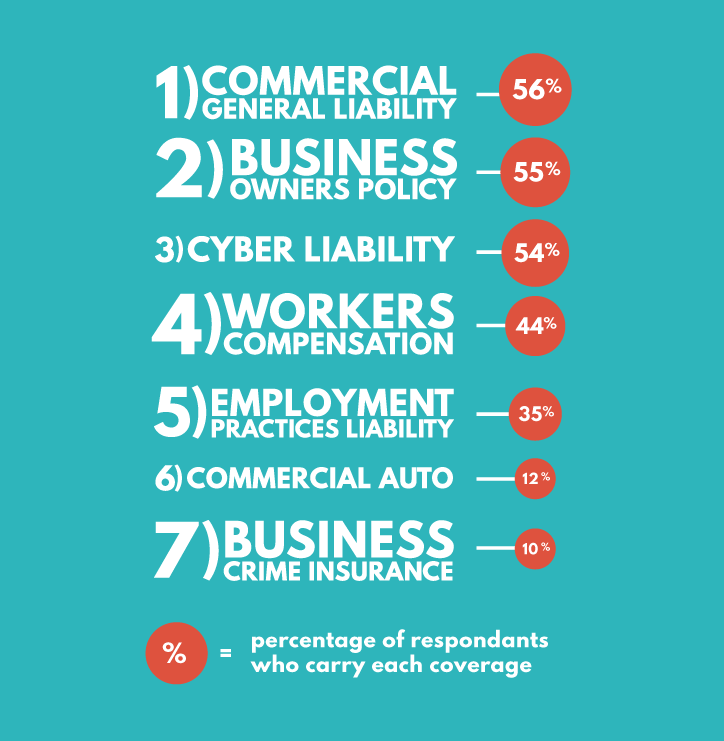While certain business risks can be unpleasant to think about and others are all too easy to minimize; unexpected things can and do happen, even to attorneys. For example, over the years some of our insureds have passed away prematurely from a climbing accident, heart attack, or cancer. Some have had to live with the consequences of a life-changing event such as a stroke or an accident that left them permanently disabled. Others have had to deal with the fallout of an employee stealing firm funds, an office break-in, a car accident, a sexual harassment claim, a ransomware attack, or a client fall. Firms have also reported weathering fires, floods, hurricanes, and lightning strikes.
We all live and work in a world full of risk. Given this reality, it’s worth thinking about what would happen if something unexpected ever happened to you. Would you be able to successfully navigate those waters, at least financially? Often the answer would be contingent upon there being an adequate amount of insurance coverage in place for the type of loss sustained. Not having insurance, or not having enough insurance, can result in a financial tipping point in your personal and/or professional life that could be extremely difficult to ever recover from.
One effective way to deal with the unpredictability of the risks we all face is to try and manage the potential consequences by obtaining adequate insurance coverage. Think about it this way. The failure to appropriately insure any of the above-mentioned risks is in and of itself a risk management decision. Inaction is at its very core a default decision to self-insure. I have a tough time believing this is what many attorneys really intend to do. Unfortunately, it is what far too many end up doing, at least for certain categories of risk.
In a recent ALPS survey, these are the lines of insurance our malpractice insurance policyholders also carry.

Of course, a decision to insure or not insure any given risk is fine as long as the decision is an intentional and conscious decision. This is how you make sure that there aren’t going to be any unplanned for consequences should the unexpected ever happen. To enable you to do so, however, you need to know what the business risks are so that informed risk management decisions can be made. Toward this end, the following list of risks and considerations is set forth for your review as a way to create awareness and to encourage the proactive management of risk because the alternative, which is typically facing the fallout from an unexpected event uninsured, is not a position most of us would ever want to find ourselves in.
What would happen if you died next month? Could your firm continue on? Would your firm have the financial wherewithal to be able to pay out your stake in the firm? Would your spouse be able to keep your house? Would the kids still be able to go to college? If you have significant wealth, would your beneficiaries have sufficient resources to pay the estate taxes? If the answer to these kinds of questions is no, consider obtaining life insurance. There are a number of options available in the market, but the important thing is to cover both the personal and business side of the equation. By way of example, “Key Person Insurance,” which would be a life insurance policy owned by the firm, is designed to help a firm carry on in the event of a partner’s death. You might couple this coverage with a fixed-premium term insurance policy in order to address your personal insurance needs.
What if you suffered a debilitating injury in a car accident? Illness and injury can lead to a partial or total permanent disability that could effectively end an attorney’s career and, when significant disabling events do occur, financial disaster often follows if this risk isn’t responsibly managed. Again, some of our insured attorneys and their families and partners have had to deal with the likes of cancer, back injuries, stroke, and mental illness with the periods of disability running the gamut from several months to lifelong.
Disability insurance is the appropriate way to manage this risk and remember to keep the following rule of thumb in mind if and when you decide to move in this direction. If you pay the disability insurance premium with after-tax dollars, the benefits will normally be tax-free. If you use pre-tax dollars or if your firm pays the premium, the benefits will be taxable. In light of such tax consequences, always visit with your tax professional prior to the purchase of disability insurance so that the purchase can be properly structured.
Disability policies also have elimination periods which, after becoming disabled, define the time the insured must wait before the benefits start. Elimination periods can range from 30 days to 1 year. Given this, the proper way to manage this risk is to couple a disability policy with sufficient cash reserves to cover living expenses at least through the selected elimination period. Also, look for a guaranteed renewable policy in case your individual circumstances ever change such that you become a greater risk. This will prevent the insurance company from canceling the policy on that basis. You might also consider coupling your own individual disability insurance policy with a group disability insurance policy, which would be purchased by the firm, as a way to ensure a larger portion of your income stream.
Finally, if funding a disability-driven buy-out is a concern, your firm might also want to look at purchasing disability buy-out insurance as a way to fund the purchase price of a buy-out driven by a partner’s disability. In short, this type of policy would enable either the remaining partners or the firm itself, to buy out the disabled partner's share of the business at an agreeable price. This coverage could be coupled with a business overhead expense policy which would provide coverage for the costs of ongoing overhead expenses (to include malpractice premiums under certain policies) during a period of disability.
What if you were at fault in a serious car accident or a guest in your home was seriously injured? Accidents happen and the resulting loss could easily exceed the liability limits of your auto or homeowners policy. Any attorney with an established civil practice could share just how common it is to find that damages far surpass the money available to make an injured party whole. Your personal assets are at significant risk in the absence of a personal liability umbrella which typically provides additional coverage over the underlying limits of both your auto and homeowners policy. While many attorneys would never consider practicing law without having a professional liability policy in place, more than a few are less diligent about obtaining a personal liability umbrella. Again, accidents happen. Don’t get caught unprotected.
What if a firm employee were to experience a work-related illness or injury? The risk is this employee may sue you to try and recover their medical costs and lost wages. Workers’ compensation insurance is how you mitigate this risk because an employee who accepts workers’ comp benefits typically can’t sue you to recover their medical costs and lost wages. While almost all states mandate that any business with employees maintain workers’ compensation coverage, each state has its own set of rules which vary widely, so you will need to determine what the rules are your state. If you find that your firm happens to be exempt from your state’s workers’ compensation rules due to size, this doesn’t mean you can’t be sued by an employee who experiences a work-related illness or injury. A decision to opt-in anyway is an excellent way to provide an additional benefit for firm employees and add additional protection from liability for your firm.
What might the fallout be if your firm experienced a computer network breach? The things that come immediately to mind include legal liability to others for the theft, loss, or unauthorized disclosure of personally identifiable non-public information; legal liability for the theft or loss of third-party corporate information; being subject to regulatory action or scrutiny due to the failure to comply with relevant security breach notification laws; having to cover the costs associated with responding to and recovering from the breach to include the costs of finding, notifying, and perhaps providing at least one year of credit monitoring for all who were impacted by the breach; the consequences of any loss or damage to your reputation; and the loss of revenue due to the breach.
Should you ever find that your firm has been a victim of cybercrime, know that most malpractice and general business insurance policies offer little to no coverage for cybercrime losses. The good news is that such risks can be properly covered with the purchase of a standalone cyber liability insurance policy.
And finally, what if your office burned down, an employee was at fault in an accident while running a firm errand, or a past employee sued you for wrongful termination? Worse yet, what if a serious fire started in your rented office space and this fire caused damage to other units in the building? What if an elderly client fell and broke a hip while walking out your front door? Year after year we hear the stories. Lightning hit the building, an employee running an errand ran a red light and broadsided a car, an employee filed a hostile work environment claim, or an office was burglarized. Again, this list could go on and on.
Most law firms do have a general commercial property insurance policy in place. The problem, if there happens to be one, is that sometimes certain specific exposures were overlooked. However, one brief aside before we go any further. A serious oversight that attorneys who are renting office space sometimes make is practicing without any commercial property insurance coverage at all. If this is the case for you, review your lease post haste. Most leases contain clauses that require the tenant to hold harmless, indemnify, and in some cases, add the property owner to the applicable policy. Here's just one concern. If a fire were to start in your rented space and then spread to and destroy other parts of the building, you could be held financially responsible for the total damage. Just know that general commercial property insurance packages are available to renters that will cover the obligations that can arise under many leases.
If you have a commercial property policy already in place, you might review your policy to see if any of the following coverage options are there. If not, these options are worth serious consideration. Note that several of these options may be available as an endorsement to a commercial package or sold as a separate and distinct policy.
Business Interruption - Also called an Extra Expense Policy, this coverage would compensate you for lost income if your firm had to move to temporary quarters due to disaster-related damage such as from a flood or fire. Business interruption insurance would not only cover the profits you would have earned had the disaster not occurred, but it would also cover operating expenses, like electricity, which continue even though your business activities may have come to a temporary halt.
Employment Practices Liability - This coverage would protect your firm by covering legal defense expenses and damages resulting from wrongful employment practices including discrimination, sexual harassment, wrongful termination, and other workplace related claims.
Employee Dishonesty - This coverage would protect your firm from financial loss due to the fraudulent activities of an employee. The loss could be the result of the employee’s theft of money, securities, or other property of the employer. Look for a policy that would also cover the theft of client funds because not all policies do.
Accounts Receivable Coverage - This coverage would indemnify your firm for amounts that become uncollectable as a result of the destruction of accounting records. It would also cover the costs of rebuilding these records.
Non-Owned Auto - This coverage would protect your firm by covering any injuries or damage that your employees are responsible for if they are ever at fault in an auto accident involving their own vehicle while out of the office on firm business. Note that this coverage may also be available under a commercial auto insurance policy, which would also protect your firm against loss or damage to vehicles your firm owns and the loss or damage your business vehicles may cause to others. Commercial auto insurance policies tend to have higher limits than personal policies because business vehicles typically need more protection.
Let us make it easy for you to find the right coverage options for your firm!




 Mark Bassingthwaighte, Risk Manager
Mark Bassingthwaighte, Risk Manager





